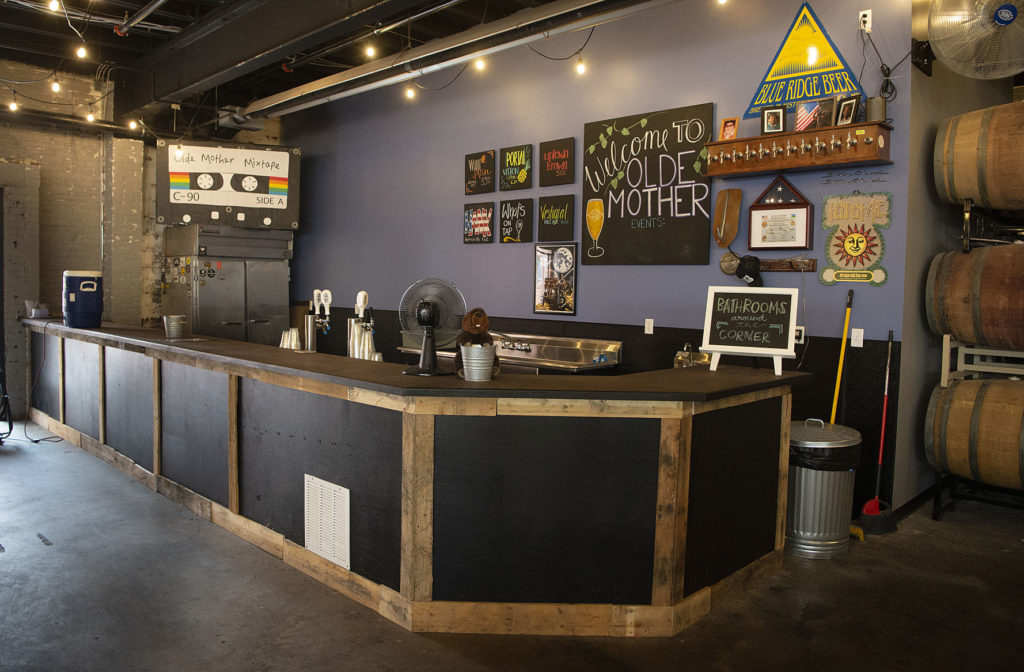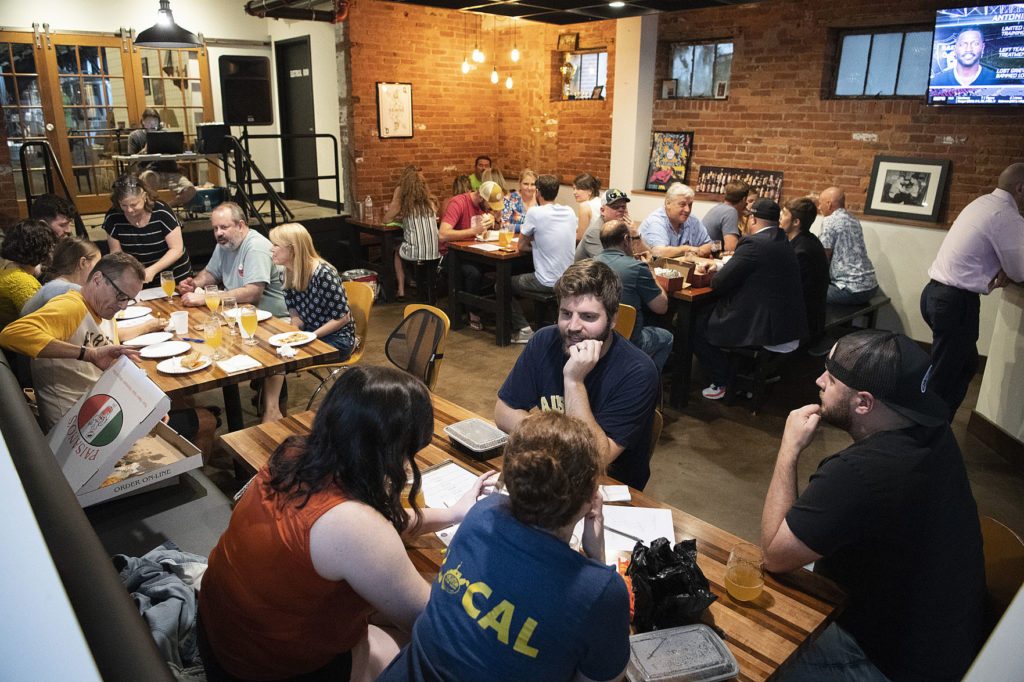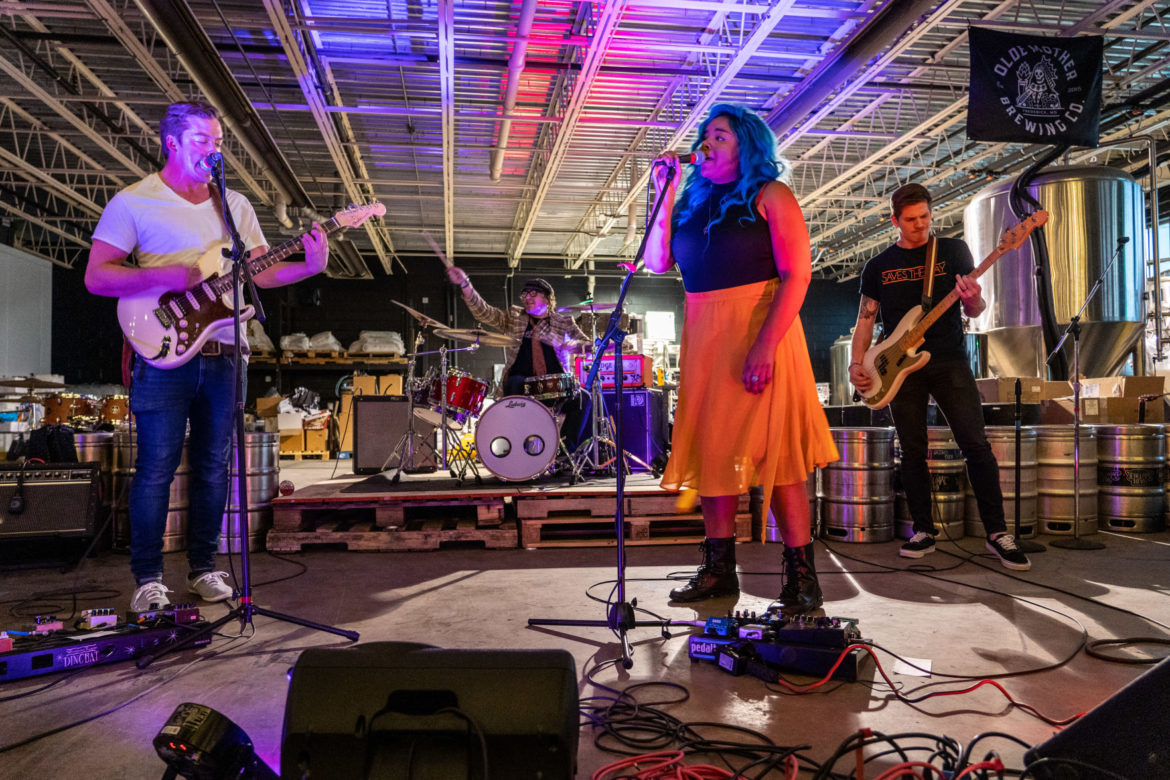By Kate Masters | kmasters@newspost.com
When Keith Marcoux and Nick Wilson were looking for a space to relocate Olde Mother — their nearly four-year-old craft brewery with a scepter-bearing skeletal logo and punchy “Listen to your mother” tagline — they had a few things in mind.
A spot with more foot traffic, obviously (the original location on East Patrick Street was just out of walking distance for downtown Frederick), and room to expand their brewing operations. They wanted live entertainment from the beginning, Marcoux said, so they were specifically looking for a space that was 10,000 square feet or bigger.
It wasn’t an arbitrary number. Marcoux learned the hard way that breweries in Frederick could only host entertainment if they met that square-footage threshold. At 10,000 square feet or more, you’re officially defined as a “brewery, farm brewery, or winery” under the city’s land management code — eligible to regularly host entertainment after receiving approval from the Zoning Board of Appeals.
 At less than 10,000 square feet, you’re a “small-scale craft brewery, winery, or distillery,” and entertainment isn’t allowed under city regulations.
At less than 10,000 square feet, you’re a “small-scale craft brewery, winery, or distillery,” and entertainment isn’t allowed under city regulations.
There are some exceptions, Marcoux said. Those “small-scale” businesses can apply for temporary zoning certificates to host up to 12 entertainment events per year. But going through the process, he added, is a hassle. Each permit costs $128 and requires approval from a bevy of agencies including the city planning department, the county health department and the county fire marshal.
Then there’s the issue of what counts as “entertainment” under current city regulations.
“Entertainment is defined, per Section 857, as any single event, series of events, or ongoing activity to which the public is invited or allowed to watch, listen, or participate in,” wrote Gabrielle Collard, the city’s manager of current planning, in an email.
The code sets some specific examples — live music and dancers, for instance, or “comedians, hypnotists, or mimes,” but the list is decidedly not inclusive. Under the current definition, Collard affirmed, yoga would be considered entertainment. A slam poetry night? Entertainment. A guest lecture on Maryland brewing history? That’s entertainment, too.
“And of course, at the old location, we didn’t get a one-day permit for all of that,” Marcoux said.
He was referring to the early years of the business, when Olde Mother was still inside a 1,764 square-foot building at 911 E. Patrick St.
“And it wasn’t anything more than us flying under the radar, because it’s just ridiculous to pay $128 for 10 people to come and do yoga in your space.”
 The brewery’s new location at 526 N. Market St. — for Marcoux, at least — comes with the added benefit of a clear conscience. In 2018, the city’s Board of Aldermen voted to consolidate five lots on the property into one, clearing the way for Olde Mother to become one 10,000-square-foot space. This March, the Zoning Board of Appeals granted the business conditional approval as a full-scale brewery, a not-quite carte blanche to host regular events without having to apply for a temporary permit. The owners are already taking advantage with Saturday yoga classes, Tuesday acoustic nights, and the occasional party.
The brewery’s new location at 526 N. Market St. — for Marcoux, at least — comes with the added benefit of a clear conscience. In 2018, the city’s Board of Aldermen voted to consolidate five lots on the property into one, clearing the way for Olde Mother to become one 10,000-square-foot space. This March, the Zoning Board of Appeals granted the business conditional approval as a full-scale brewery, a not-quite carte blanche to host regular events without having to apply for a temporary permit. The owners are already taking advantage with Saturday yoga classes, Tuesday acoustic nights, and the occasional party.
In July, Olde Mother hosted a ’90s party with two live bands and a DJ, inspiring so much dancing that Marcoux said he found worn strips of rubber on the floor from spent sneakers. He and Wilson recently opened a 4,000 square-foot back room with a six-tap bar, two new bathrooms, and a neat row of dartboards that, on Wednesdays, become the targets for two in-house dart teams. There’s cornhole on Thursdays and a launch party for the 72 Hours Film Fest in October. Olde Mother will hold an anniversary party later that month. And while most of the brewery’s planned events are small, Marcoux said, they all help business.
“The more breweries that open in Frederick, the more you have to set yourself apart,” Marcoux said. “We’re all friendly, but at the end of the day, we all have families to support.”
But what about the other breweries?
There’s an obvious problem when it comes to the other craft breweries and distilleries in Frederick. They just don’t have the space.
“First of all, 10,000 square feet is kind of hard to come by unless you’re in an industrial zone,” said Mike Clements, the owner of Idiom Brewing along Carroll Creek in downtown Frederick.
The brewery occupies 3,200 square feet in the Union Knitting Mills building, and Clements is adding another 2,800 square feet by expanding into an adjacent unit. Even when the project is complete, it will leave him 4,000 feet short of the requirements for a full-scale brewery.
“The irony is that we spent more money per square foot for the foot traffic, but the flip side is that we’re not in a space large enough to host live music,” he continued. “Then again, where else would we go? I mean, for 10,000 square feet with good foot traffic in an area that’s adjacent to downtown Frederick? You’re looking at a monthly expense that would be way too high for most of the businesses here.”
What bothers Clements and some of his business-owning peers, including Paul Tinney of Rockwell Brewery and Monica Pearce of Tenth Ward Distilling, is that the restrictions on craft beverage manufacturers seem so arbitrary. After all, they pointed out, city zoning allows for restaurants with entertainment. There are plenty of spots downtown where you can find live music — and just as much beer — in spaces a fraction of the size of commercial craft breweries.
“I have friends who operate restaurants that are a quarter of the size of Rockwell,” Tinney said of his 4,000 square-foot brewery. “I can understand why the city is concerned, but you do entertainment that’s appropriate for the size of the space.”
There is rationale behind the city’s current zoning regulations.
When craft breweries were first introduced as a permissible land use for the city of Frederick, the original applicant — Swordfish Partners LLC, the company that owns the property where Rockwell is based — specifically neglected to include entertainment as a possible activity for those businesses. This was intentional, according to Collard’s email.
“The intent was to create a use that was permitted ‘by right’ in certain districts,” she wrote, “not requiring conditional use approval through the ZBA.”
In other words, small-scale craft breweries and distilleries can open in certain zoning areas without special permission, something that businesses with entertainment aren’t able to do. Marcoux said he had to send letters to every single one of his neighbors — even across the street — notifying them of the brewery’s upcoming hearing with the Zoning Board of Appeals. The board then set more restrictions as a condition for approving live entertainment, including limiting the amount of space in the brewery available for events. Overall, Marcoux can only use about 4,000 square feet — roughly 40 percent of the overall indoor square footage — to host entertainment.
“Entertainment has historically been regulated as a conditional use,” Collard wrote. “The reason being is that there is a potential for nuisance impacts.”
Loud noise, more traffic, less parking — they’re all possible symptoms of regular event programming. And until 2016, the city didn’t allow any craft beverage manufacturers to host entertainment.
That year, Frederick amended the land management code in response to Flying Dog Brewery’s plans to expand in the city. The change allowed some breweries (and wineries) to host regular entertainment with approval from the Zoning Board of Appeals. The entire ordinance would have made it easier for Flying Dog to do business, but it also catered to large-scale manufacturers. Hence the 10,000 square-foot size requirements.
“Whatever the reason, it’s affecting all of our livelihoods,” Clements said.
Like several other small-scale brewery and distillery owners in Frederick, he only discovered the restrictions after he opened Idiom. It put a considerable damper on some of his plans for the brewery, which included weekly live music and an active cornhole league.
“My initial thought was, ‘Well, that kind of blows a big hole in our business model,’” Tinney said.
For years, he’s been making acoustic guitars, and he envisioned Rockwell as another hybrid event space that would combine live music with craft beer.
Since the brewery opened in 2017, he’s pulled several temporary permits for major events with musical entertainment. But Rockwell also hosts some smaller activities, including a weekly trivia night, which is held without a permit.
“I didn’t anticipate we’d need one,” Tinney said. “We just don’t ask. It seems like anything that draws anyone to your brewery would be considered entertainment, so I don’t know how to parse it.”
Testing the limits
The ambiguity of the current zoning could account for the occasional events at breweries and distilleries around the city.
For business owners like Tinney, even small activities are a way to keep customers in their seats for a longer amount of time. And for the customers, those activities can elevate an experience that would otherwise amount to drinking at a bar.
“I seek out live music,” said Ashley Tolino, 23. “It just adds a vibe. It’s a very unifying thing to do.”
Last week, she and her friend Daniela Arrue, also 23, were attending an event at the Tenth Ward Cocktail Lab on East Patrick Street. Music was streaming through a lone speaker at the front of the room — mostly ’90s hits from TLC and the Backstreet Boys.
The “unifying” component of live music was proven just a few minutes later when the entire bar — every last person — started singing along to “Give Me One Reason” by Tracy Chapman. After the song ended, Dani Buhl, a part-time MC, switched to “September” by Earth, Wind & Fire.
“Fun fact,” she yelled. “This is usually my drunk song.”
“Mine too,” yelled back Greg Williams, 30, nursing an ice-filled cocktail glass.
He was there with a few friends, including 35-year-old Amy Reese. They’ve both noticed that it’s a “rarity,” as Williams said, to find events at local breweries or distilleries. But when they can, it makes an impact.
“For example, the first time we were here was last week,” Reese said. “For another event. And we’re like, ‘Oh my gosh, we’re coming back every week now.’”
“It gives you something to do other than drinking,” Williams added.
“And the drinks here are kind of expensive, so I don’t know if I would come back otherwise,” Reese said (for the record, a cocktail at Tenth Ward costs $9).
Catching up with the trend
Over the past five years, as craft breweries and distilleries become a concentrated sector of Frederick’s economic development, city groups and officials have opened up to live entertainment.
In January, the Downtown Frederick Partnership convened a working group to discuss live entertainment in the craft beverage industry, a huge consortium including brewery owners, restaurateurs, Neighborhood Advisory Council 11 members, and other city representatives. Alderman Roger Wilson initiated the group after a request from Rockwell co-owner Matt Thrasher, one of the initial brewery owners to take up the issue.
“I wanted to make sure there was fairness in the system,” Wilson said. “But I also can’t discount that tourism is a big industry in Frederick. And when our tourists come, they’re looking for an experience. We have an experience-based economy and they’re looking for a place where they can spend some time.”
The immediate result of that line of thinking was draft legislation to allow entertainment at the city’s small-scale breweries, wineries and distilleries. The suggested ordinance, according to the staff report, would shift permissions for both small-scale manufacturers and restaurants, allowing them to host entertainment without zoning board approval as long as the events are held between 9 a.m. and 9 p.m. (10 p.m. on weekends) and kept indoors. “Primary functions” of the business would need to continue, and the space would have to be more than 500 feet from the nearest residential lot in all but the Downtown Business and Mixed Use zoning districts. Any entertainment beyond those criteria would be eligible for conditional approval by the zoning board.
The mayor and Board of Aldermen considered the legislation at a workshop Wednesday, and it still needs to go through a public hearing before the board can vote. Wilson, though, expects majority approval.
“I can’t quantify it because I’m not in the business, but I will qualify it as a patron,” he said. “Going to a brewery or distillery and having the opportunity to listen to music — it adds that pizzazz. Here in Frederick, we say we’re hip and historic. Now we’re trying to jazz up the ‘hip’ part of it.”

